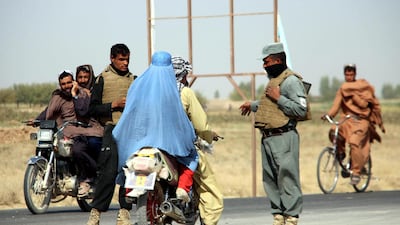As Taliban leaders sit across the table from the Afghan leadership in Doha to negotiate an end to the two-decade conflict, fighters on the ground continue to launch offensives against Afghan forces in the country.
The most recent of these – the failed siege of Lashkargah, the capital of the southern Afghan province of Helmand – revealed fractures within the insurgent group, analysts said.
“I hear not all Taliban leaders were on board vis-a-vis this attack,” said Hekmatullah Azamy, deputy director of the Centre for Conflict and Peace Studies.
Mr Azamy has been closely monitoring the conflict and the current intra-Afghan talks and believes there is evidence that key Taliban leaders are "not looking eye to eye on peace and war".
This internal discord, Mr Azamy fears, will have an effect on the ongoing talks, particularly on the prospect of a ceasefire, a condition the Afghan delegation has been aggressively pushing for.
“The key issue is that a ceasefire has been almost impossible for the Taliban to agree to, for many reasons but largely because many among their ranks want to continue the violence,” Mr Azamy said.
Similar observations were made by the former Afghan intelligence chief, Rahmatullah Nabil, who blamed Taliban factions close to Iran for the attack on Helmand.
"The reason they are not accepting the ceasefire is because it will expose them, because there are several groups within the Taliban who will disobey them on the issue of stopping violence," Mr Nabil told The National.
Mr Nabil, who still has strong intelligence networks throughout the region, named local commanders in Helmand such as Zakir Qayum and Sadr Ibrahim, the former deputy head of the military commission, as elements within the Taliban who are likely to continue fighting.
"Other groups who control routes used for smuggling would also prefer if the conflict continued. These groups have expressed opposition to the Doha talks,” he said. There was a chance, he said, that these opposing groups could align under a new umbrella group in future.
“The Qataris and [US special envoy Zalmay] Khalilzad may push to show that the Taliban are a unified force but the ground realities are different,” Mr Nabil said.
Those fighting on the ground, he said, see the Doha talks as not in line with their objectives and a betrayal of their ideologies. “There are groups supported by Iran and Pakistan that believe they can succeed in taking over Kabul militarily, and are objecting to these negotiations,” he said.
Additionally, the fluid nature of insurgent loyalties in Afghanistan may be a contributing factor to their inability to agree on the ceasefire.
"If you look at the Taliban's shadow structure, they have dozens of governors who are also operating for other groups – some are only 10 per cent [of the time] with Taliban and 90 per cent with another group like JeM [Jaish-e-Mohammad] or LeT [Lashkar-e-Taiba] etc," Mr Azamy said, laying out the findings of a study he conducted of insurgencies in the region. "Many Taliban have several caps these days. And they can change them very easily."
While Taliban leaders are reluctant to submit to a ceasefire, they did agree to a “reduction in violence” in the deal with the US administration made this year. But without a clear definition of reduction, the group has continued to mount attacks on Afghan military interests, perhaps to build a stronger negotiating power, analysts suggest.
But the attack on Helmand, a former stronghold of the UK forces in Afghanistan, is seen as a breach of the February agreement even by the US forces who are hoping to leave the country as part of the deal.
Mr Azamy believes that the Helmand attack was the Taliban testing their boundaries with the field forces who are set to withdraw from the country as part of the deal with the US administration.
“The Helmand attack is part of Taliban pitch to test whether the US would seriously intervene or not,” he said.
The US forces, however, responded by extending air support to Afghan forces in thwarting the attack from large numbers of Taliban fighters who took control of several Afghan security check posts and government buildings.
“The Taliban need to immediately stop their offensive actions in Helmand province and reduce their violence around the country. It is not consistent with the US-Taliban agreement and undermines the ongoing Afghan Peace Talks,” Gen Austin Scott Miller, commander of Resolute Support and US forces in Afghanistan, said on Monday.
“The US is slowly realising that the Taliban are not abiding by the Doha agreement and a change is expected on the part of the US,” Mr Azamy said. This incident could convince the US to maintain a small contingent of foreign troops during negotiations, he said.
“It helps the Afghan government make the case that even with a couple of thousand US soldiers, they can stand and prevent the Taliban from taking over a province,” he said.
Mr Nabil also hoped that the US would take this opportunity to challenge the legitimacy of the Taliban power.
“The Soviets came to our country by force and then left the legacy of the war on the Afghans. I hope the US will not do the same, and blame the Afghans for not being able to find a solution to the conflict,” he said.

